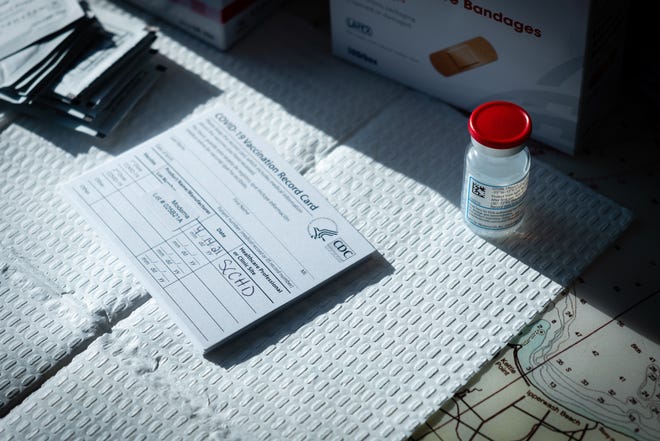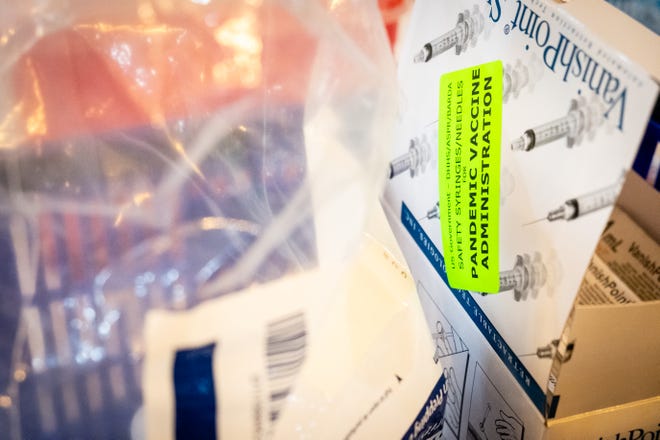No plans yet for COVID-19 boosters in Blue Water Area

As the potential need for a COVID-19 booster begins to take focus in discussing the region’s stagnant immunization rate, local health officials said it may be too soon to speculate on plans.
St. Clair County Health Department spokeswoman Jennifer Michaluk said it is important for agencies to note the difference between the additional dose versus the booster.
The additional or third dose has already been recommended by the U.S. Centers for Disease Control and Prevention for those moderately or severely immunocompromised. The third dose can be given at least four weeks after their second Pfizer-BioNTech or Moderna dose.
While the booster has been recommended by the Biden administration for anyone after eight months following their second dose, it has not yet been approved by federal health officials.
“We have not heard about the boosters yet at this time,” Michaluk said in a statement late last week. “We will not provide boosters outside of published recommendations from the ACIP (Advisory Committee on Immunization Practices).”

Pharmacist Jim Kaski said he and others like him are already getting questions about the options, particularly those who may fit the additional dose needs.
Kaski, president of the St. Clair County Pharmacists Association and head of the local Blue Water Immunization Partnership, was an early advocate and recipient of the coronavirus vaccine overall.
“I think that the booster shot, so to speak, is a little bit presumptuous at this time,” he said. “However, I want to make sure that additional vaccine — you know, with those that are immunocompromised — be given. They need to talk to their care provider, other physician or their pharmacist and determine whether or not they are being treated as an immunocompromised individual patient and then to receive that third dose.”
According to the CDC, those who’ve been receiving certain cancer treatments, have received an organ or stem cell transplant, or have advanced or untreated HIV, are recommended for an additional dose.
Michaluk said that’s something community providers, including private offices, pharmacies and the health department are accommodating by appointment.
Would boosters still help when vaccine rates are low?
As of this weekend, about 51.9% of St. Clair County residents ages 12 and up received at least one dose of the vaccine. More than 128,900 doses had been administered.
The health department reported there had been a 0.09% increase in the number of vaccinated residents since Aug. 2.
According to the state, Sanilac County has administered more than 16,100 vaccines as of Aug. 20. Roughly 45.5% of residents there have received at least one dose of any vaccine.
Health officials in both counties have said previously that the farther north you go, the more hesitant toward any mitigation measures, including vaccines, the population tends to be.
Both Michaluk and Kaski said they thought moving forward with additional or booster doses, once the latter has formal guidelines issued, should be part of a dual strategy to tackle any hesitancy, and ultimately, the efficacy of the community’s vaccine coverage overall.
“You need both. You need more widespread vaccination rates to begin with and the booster recommendation,” Michaluk said. “As long as there are unvaccinated or under-vaccinated individuals in a community, there is always a risk of illness and disease transmission. More widespread vaccinations would do more to suppress viral load.”

Do boosters create any confusion around vaccines?
When asked, Michaluk said there weren't any common misconceptions that authorities were hearing related to a potential booster.
But Dr. Mark Hamed, medical director for health departments in Sanilac, Tuscola, Huron and Lapeer counties, said he could understand how the booster may create some confusion for residents.
Kaski said something similar, adding they’re still waiting for terms of a booster to be more “clearly defined," such as who can get it.
“As we get closer to, you know, let's say a year (from the earliest vaccinations), I think that there's going to be much more studies done,” he said. “And then, I think it'll be a whole lot more defined as to who will, who that booster dose is going to be recommended for.”

Although they’re still learning about the long-term immunity against the virus, Hamed said the booster could be “a good precaution.”
“To help just in case the levels of antibodies aren’t sufficient enough to protect,” he said. “Now, how do we (notify) the public without confusing them? I think we have to break it out very clearly into layman's terms, PowerPoints, you know, easy messaging, but we have to do a good job at that. We have to really explain the way that faded away because we're going to have the anti-vaxxers coming out, saying, ‘Look, I told you it doesn't work.’”
During a live question-and-answer session last Thursday, St. Clair County health officials got inquiries about the booster.
Rebecca Campau, a nursing supervisor for the health department, said they’ll put the information out on social media when those doses become available.
“Right now, we’re still waiting on more guidance from the CDC and MDHHS, but it looks like possibly around Sept. 20, those booster doses will be available,” she said. “As far as rolling them out through St. Clair County, we are expecting booster doses to be readily available through cooperation and partnership with our local pharmacies, local physicians, as well as here through (the) St. Clair County Health Department. And really vaccines, right now, are in able supply, so we don’t anticipate there being the shortage and difficulty there was at the beginning of COVID vaccines.”
Contact Jackie Smith at (810) 989-6270 or jssmith@gannett.com. Follow her on Twitter @Jackie20Smith.